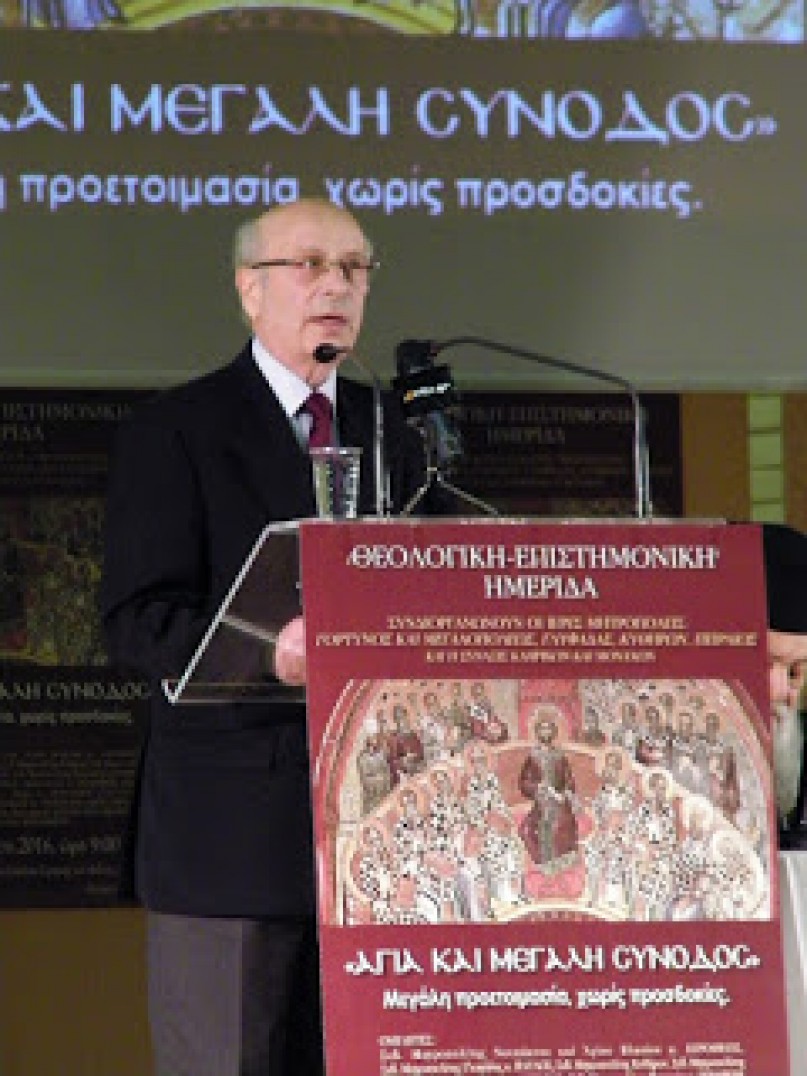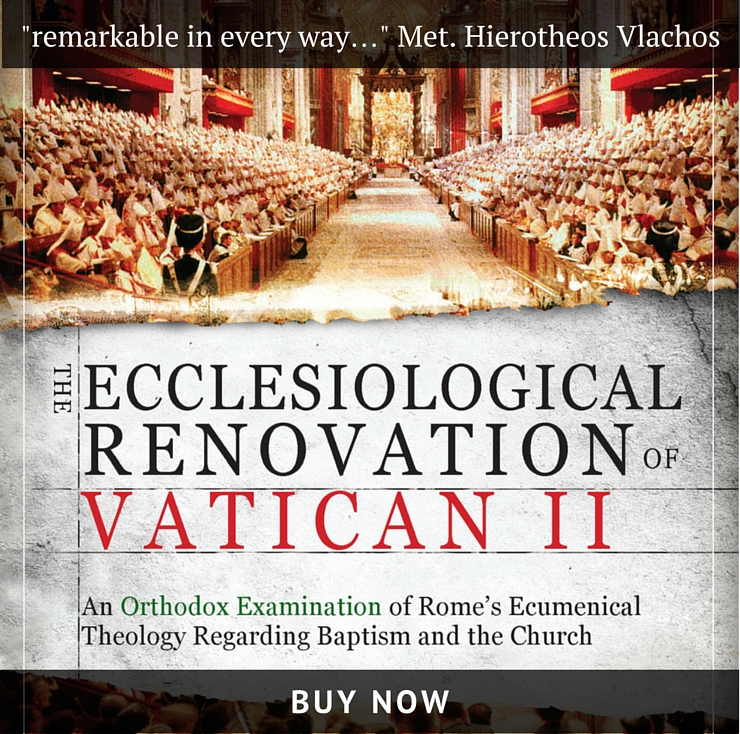SUBJECT: Regarding the institutional legitimization of the schismatic Church of Ukraine
Most Blessed Primate,
Reverend Holy Hierarchs,
With regard to the upcoming convocation of the Holy Synod of Hierarchs, as the least member of our local Church, but also as professor of the Church’s Dogmatic Theology, I would like– with a sense of responsibility– myself humbly to put into Your view some Dogmatic-Ecclesiological dimensions, as well as some soteriological ramifications of unconditionally accepting the schismatic Church of Ukraine into ecclesiastical-sacramental communion, in the event, of course, of an eventual Synodal decision by You to recognize its “autocephaly”.
The first and most important issue is, in this case, the Ecclesiological issue, which is relevant to the “ecclesiastical construct” in question. First of all, it should be examined whether this “construct” fulfills the conditions of an Ecclesiastical Community. If, on the contrary, its “autocephaly” is recognized, then the ecclesiastical “legitimacy” of the Schismatic Church is automatically recognized.
As is well-known, there has previously been Pan-Orthodox condemnation of the Schismatic Church of Ukraine with defrocking and excommunication. This Pan-Orthodox condemnation has not been revoked. Finally, with the Ecumenical Patriarchate’s Tomos of Autocephaly (January, 2019), an institutional overreach of a spiritual and ecclesiological character occurred, which raises reasonable questions about its ecclesiastical legitimacy. And this is because, at least as far as we know, the fundamental patristic and spiritual conditions were not met, something that raises reasonable objections to the canonicity of the terms and conditions of the Patriarchal Praxis, so long as there has not been public repentance and renunciation of Schism. What we are saying in the case in question does not mean that we are calling into question the institutional competence of the Ecumenical Patriarchate to grant Autocephaly with the consent, of course, of the entire of body of the Church expressed synodally. Here only the issue of the valid conditions for issuing the Tomos in question is being raised.
According to scriptural testimonies (Matthew 4:17, 1 Corinthians 5:1-5 and 2 Corinthians 2:6-8), as well as according to the Patristic and Spiritual tradition of the Church, the integration or reintegration into the one and indivisible body of the Church in any case presupposes a profound experience and sincere expression of repentance on the part of the member or wider community being integrated or reintegrated.
The condition of expressing repentance is not invalidated or annulled by any institutional person or institutional ecclesiastical body. There exists no Ecclesiastical Economy that can replace or annul repentance. Repentance itself constitutes the fundamental condition and spiritual “key” to receiving and possessing the Economy of salvation, as well as the “key” to activating or reactivating it, in accordance with the testimony of Scripture: “Repent, for the kingdom of heaven is at hand” (Matthew 4:17).
For precisely this reason, the Meletian Schism in the ancient Church was restored after not only expression of repentance, but also the anathematization of the Schism by the Schismatics themselves. And, as St Theodore the Studite characteristically notes, “anathematizing their own schism, as they say, they are received into the Catholic Church” (Letter 40 to Naukratios, PG 99 1053C). Only then did there follow the synodal Pan-Orthodox restoration at the First Ecumenical Council.
In the case of the Schismatic Church of Ukraine, as it appears, no repentance was sought or expressed. Here, in practice, repentance was annulled, even though it is an explicit commandment of the Lord and the age-old practice of the Church. There can be no talk of Ecclesiastical Economy for this. In fact, this is a flagrant ecclesiastical transgression, which makes salvation impossible, not only for the Schismatics, but also for those who sacramentally commune with them, since they too become excommunicates (see Canon 2 of the Council of Antioch, which was validated by the Fifth, Sixth and Seventh Ecumenical Councils).
From the above, it becomes clear that the issue in question is essentially Ecclesiological-Dogmatic, with inevitable soteriological ramifications, as has already been very rightly expressed in the Letter of the Hagiorite Elders to the Sacred Community of the Holy Mountain (March 2019).
For this reason it is also essential that the Holy Synod of the Hierarchy decide on the identity of the Schismatic Church of Ukraine and to demand the application of the age-old ecclesiastical conditions for its reintegration. That is, repentance and the anathematization of the Schism. This spiritual responsibility is fully within the competence of the Hierarchy about to recognize the “Autocephaly” in question, which of course has other parameters of Canonicity, so long as it does not take into account the existence of the Canonical Church in the same country, under Metropolitan Onufry of Kyiv, the Canonical Church from which it split. That is to say, “Autocephaly” has, in this case, been granted to unabashed schismatics. And this unprecedented matter, which is logically, canonically and spiritually unthinkable, is now being asked to occur with the Synodal consent of our Church.
With the “rationale” for accepting the Tomos of “Autocephaly” of the Schismatic Church of Ukraine, we are in danger of possibly also being led in the future to the sacramental acceptance of Papism and other heresies without the fundamental conditions of repentance and the renunciation of their dogmatic delusions, something that Ecumenism attempts today, not only in theory but already in practice. So we wonder, essentially, whether the spiritual institutions within our Church have begun to “function” devoid of their spiritual foundation. We wonder whether in recent decades a “new ethos” has been introduced with the hidden aspiration to become the habitual ethos also in customary law, which will undermine the Canonical Tradition of the Church. Historically, we know that when such a mentality was consolidated in the West, the Western Church was led to Papism– with all its dogmatic deviations– and ended up cut off from the One and only Church.
To summarize, we note that any eventual decision about the “Autocephaly” of the Schismatic Church of Ukraine cannot be unconditional. Because then– indirectly but clearly– it would mean in practice an illegal ecclesiastical-institutional “legalization” of the existing Schism, something that has no historical precedent in the Ecclesiastical Tradition of the Holy Fathers. Most importantly, the eventual recognition without spiritual conditions gravely harms the unity of the entire Church, something than which there is nothing more precious. The danger is clear– that of creating Schisms throughout the entire Church on account of your eventual assent to recognizing the “Autocephaly” of the Schismatic Church of Ukraine, something that we wish to avoid with all our heart.
Finally, the spiritual solution to the current ecclesiastical problem is repentance. And unfortunately, at the moment this is lacking. Nevertheless, there is realistic hope. Those of us who love the Church in Christ, let us ourselves take the cleansing and deifying medicine of repentance and then Christ will give healing to the sick, according to the testimony of the Holy Fathers [see St Nicholas Cabasilas: “everyone marvels at God’s goodness, though no one escapes an illness when someone else takes the medicine, seeking to be released from chastisement while others suffer” On the Life in Christ, Part 7, PG 150 700C) Here some may marvel at the goodness of God. No one can be rid of illness without taking the medicine. Can someone be rid of the consequences of sin when others do the work for them?]
With the deepest respect,
Dimitrios Tselengidis
Professor at the Aristotle University of Thessaloniki



Please be kind, lest your comment go the way of Babylon.